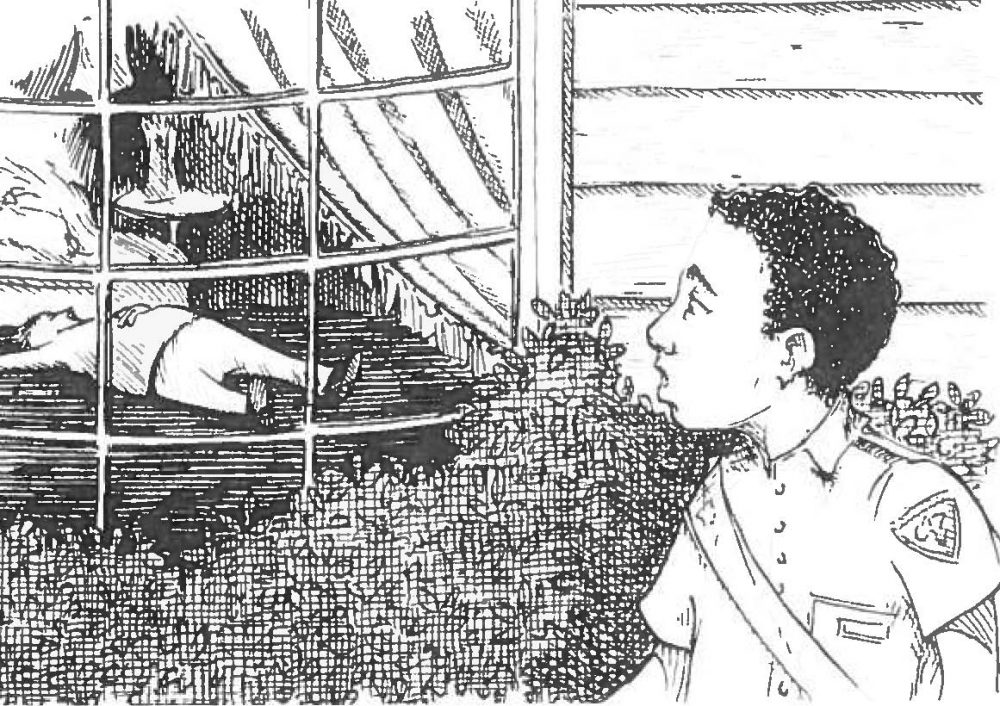The Poker from Nowhere
By Hy Conrad
Sherman Holmes and Sergeant Wilson stood side by side. They were staring at a bloody corpse sprawled face up in the living room of a suburban tract house.
Sherman spoke first. “A premeditated crime, what ho?”
Wilson frowned. “What makes you say that?”
 “Choice of weapon.” The round little man pointed at the fireplace poker. It had been used like a sword, stabbing its victim several times in the chest and stomach. “When we were walking up the drive, I didn’t see any chimney.”
“Choice of weapon.” The round little man pointed at the fireplace poker. It had been used like a sword, stabbing its victim several times in the chest and stomach. “When we were walking up the drive, I didn’t see any chimney.”
Wilson looked around. “You’re right. So, the killer brought the poker from another location, which indicates a planned murder. Very observant.”
Holmes and Wilson had been in the midst of one of their occasional lunches when the call came in on the sergeant’s cell phone. A mail carrier, making his rounds in a quiet neighborhood, had happened to glance through a living room window. He saw pretty much what they were seeing now, a large, elderly man who had died trying to fend off a brutal attack.
The responding patrolmen interviewed the next-door neighbor, a nearly deaf woman who claimed not to have heard or seen a thing.
“Harold Kipling.” The sergeant was reading from the patrolman’s notes. “A widower living alone. Three children, none of whom seemed fond of him. A life insurance policy was split among the kids, plus some savings. There had been fights about a nursing home and money.”
“The children all live locally?” asked Sherman.
As if to answer the question, a patrolman eased open the door. “The victim’s kids are here, Sarge. I told them he was dead. I hope that’s okay.”
The sergeant and his civilian partner walked out onto the lawn to face two middle-aged men and a woman. Wilson adopted his best corpse-side manner.
“Your father was murdered,” he told them. “We don’t know much more than that. The murder weapon was a fireplace poker.”
“Fireplace poker? Dad doesn’t have a fireplace,” the older son said.
“We know that.”
“So, what happened? Someone broke in with a poker and stabbed him to death?”
“There were no signs of forced entry,” Wilson explained.
“Did your father get into many fights with people?”
The younger son found this amusing. “Just with us. He wanted to move into a nursing home. We didn’t feel it was necessary.”
“He wanted to go?” asked Wilson. This was certainly a switch.
“It’s an expensive nursing home,” volunteered the daughter. “He wanted to cash in his life insurance and use up his savings. It was a very selfish idea.”
“I dropped over this morning,” said Gary, the younger son. “Dad had already signed the papers. We argued about it, then I left. I called Jason and Jennifer.”
“Right,” said Jennifer. “Jason, Gary, and I decided we would come over as a group and try one last time. We got here just a few minutes ago.”
“Can we see him?” Jason asked. There was a nervous timidity in his voice.
Sherman had been silent throughout the interview, but now he spoke up. “I think it would be fine for two of you to see the body. But one of you needs to answer a few more questions.”
WHICH SUSPECT DOES SHERMAN WANT TO QUESTION?
WHAT CLUE MADE SHERMAN SUSPICIOUS?
The patrolman ushered the daughter and the younger son into the house, while Sherman stood on the brick path and smiled benignly at the victim’s oldest child.
“Does your house have a fireplace, Jason?”
“As a matter of fact, it doesn’t. But Jennifer’s got one. And I think there’s one in Gary’s apartment.”
“Is that why you chose a poker as the murder weapon? We can trace where you bought it, you know.”
“What are you talking about?” Jason’s voice rose in anger. “Are you accusing me of stabbing my father?”
“I am. How do you know he was stabbed?”
Jason stopped and looked confused. “The poker. You said he was killed with a poker.”
“That’s right. And if I told a dozen people that a man had been killed with a poker, I expect the full dozen would assume he’d been hit – bludgeoned, if you will. It’s by far the easier, more common way to use the instrument. And yet, you somehow knew he’d been stabbed.”

